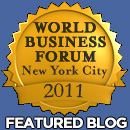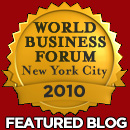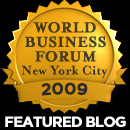May06
World Innovation Forum T5 case study: Mixed-Use is Effective Use
Point: Merging functionality can create innovations in efficiency and convenience
Story: As someone who spends more than my fair share of time in airports, I’ve wondered if passengers don’t deserve frequent flier miles for distances walked all over the terminal buildings. The food court is one place, the gate is in another, and finding a power outlet to recharge the laptop for the long flight home is always a challenge. In most airports, no single location suffices for all these purposes. When sitting at the gate, one doesn’t know if one has time to go grab a bite to eat. And when sitting at the restaurant, one doesn’t know if one’s flight is about to board.
OTG tackled this problem when they designed the airport experience for JetBLue’s new T5 terminal at JFK airport. OTG created a new mixed-use approach for some of the gate space. About half the 26 gates have special 16-seat clusters called “re:vive” that lets passengers eat, recharge, and keep an eye on their flight. Touchscreen monitors and credit card readers let passengers order, pay for, and have food delivered right to the gate. The ordering process even provides a delivery time estimate before a passenger gives the final “OK” for the order.
“Re:vive” is more than just a passenger convenience. It also boosts revenues for food concessionaires by reaching the underserved market of so-called “gate huggers” — passengers who don’t want to leave the gate area.
The “re:vive” concept is not unlike the notion of mixed-use building developments for cities, which create buildings with retail on the first floor, offices on the second and residential condos or lofts on the top floors. Mixed-use reduces urban sprawl and urban commuting times in the same way that re:vive reduces airport terminal sprawl and the burden of dragging luggage to and fro. Co-locating the functions that people need provides convenience.
Action:
- Look for the customer activities that are currently separate but that could be concurrent or co-located
- Merge functionality to reduce time, opportunity costs, and logistical overhead
- Grow markets by serving those that don’t or won’t move from activity to activity
Source: World Innovation Forum presentation May 6, 2009
Comments Off on World Innovation Forum T5 case study: Mixed-Use is Effective UseCase study, How-to, Innovation









